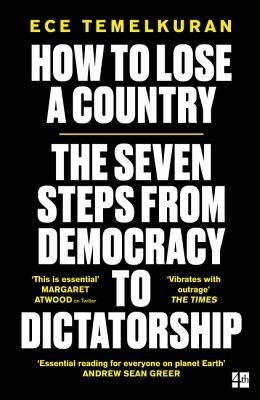REVIEW | How to Lose a Country by Ece Temelkuran
AUTHOR: Ece Temelkuran
ISBN: 0008294046
FIRST PUBLISHED: Feb 7th 2019
EDITION RELEASE DATE: Jul 25th 2019
PAGES: 272 PAGES
EDITION LANGUAGE: ENGLISH
★★★★☆
This book is a warning of how nationalism is coming (back) to us globally more popular than before, the signs we need to pay attention to, and the consequences that would follow if many countries failed to prevent the dissolution of democracy.
Cover of Spanish edition
Losing her homeland Turkey, Temelkuran examined the transformation and the political tools the Erdoğan regime used to popularize nationalism and popularism, divided people, damaged democracy step by step with seemingly small changes, and eventually turned Turkey into a land of dictatorship. At the same time, Temelkuran emphasized on these political moves are not exclusively happening in Turkey, they can happen to a lot of democratic countries. Actually, the change has already happened to many countries that people think would never fall into nationalism pr dictatorship without alert.
This is a book that we need to read NOW (as soon as we found out about the book). It’s alarming to know how many similarities there are between the events that transformed Turkey during the years and the things that happened in other western countries. Temelkuran not only led me to see many things I observed and realized during my nearly 10 years of living in the US, but also pinpointed many phenomenons I haven’t recognized but indeed experienced. Especially during and post-Trump's presidency in the US and Brexit in the UK.
She also analyzed the roles people play in any country’s transformation, and how the shifting of social responsibility works in the current age. Studied the recent events in Western countries, Temelkuran pointed out how and why the concept of “real people” was created by propaganda, how it’s harming, and why it would be a struggle to debunk the concept.
All the examples she used, whether they are things happening in Turkey or other countries, and relatable and some are surprisingly common enough. Each is a reminder that democracy is at high risk and what happened to Turkey could easily happen in other places.
Cover of Dutch edition
One big takeout I got from this book is, we should take more time to communicate with the people who are holding similar thoughts with us, discuss a common goal that we want to reach, and work out a path to it. Instead of using our precious time to focus on people who are holding opposite opinions. Especially in this distractive internet age, maybe uniting with more people and developing plans to move forward is more essential than putting a lot of our energies on negative impacts.
However, this book is extremely Western-focused, especially the chapter about citizens’ impression of their fascist leaders and how it’s dangerous if one underestimates their opponent. Growing up with an Asian background, I don’t think a lot of the analysis about leaders applies to a lot of countries with paternalism leaders (I could be wrong!). When Temelkuran summarized the similarities, the phrasing makes you wonder they apply to any kind of government. So I think it’s worth mentioning that it has its limitations.
With that, it doesn’t affect the importance and the masters of this book. And in my opinion, paternalism is a later stage of the dissolution of democracy after all. I still think this is a must-read for everyone and it’s a great guideline for us to reflect on our daily lives and maybe, we have a chance to stop the world sliding from democracy to dictatorship.


